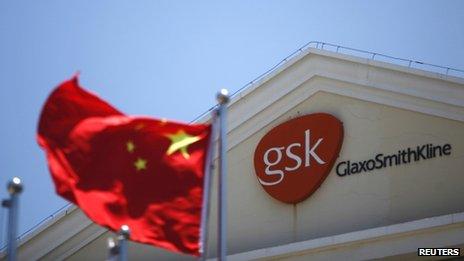Why didn’t Glaxo spot the alleged Chinese fraud?
- Published
- comments

China has become cagey about the GSK affair
In his first public pronouncements on allegations that GlaxoSmithKline executives bribed officials and doctors in China and may have defrauded GSK itself, the drug giant's chief executive said that any wrongdoing seemed to have taken place outside of the company's controls and processes.
That's why Sir Andrew Witty and his senior colleagues were blissfully unaware that criminal acts were allegedly being committed to generate more than £750m a year of annual sales in China of pharmaceuticals and vaccines - or so he said.
But Sir Andrew added that he believed Glaxo's worldwide control systems were excellent.
Which is a slightly odd thing to claim, perhaps, given that the Chinese authorities have said that £320m was involved in the supposed crime.
Even if the accused Chinese executives committed illegal acts in their own time and using their own computers, £320m is a lot of money to go walkies. Surely monitoring systems that GSK thinks of as robust would have detected misuse of funds on that scale - unless the monitoring systems are Nelsonian in their sightedness.
But perhaps the scale of the crime isn't quite as much as that. My sources in GSK seem to believe the money involved may ultimately turn out to be millions of pounds, not hundreds of millions of pounds.
That said, the Chinese authorities appear all of a sudden to have got the collywobbles about all the media and public interest in what transpired at Glaxo - in the sense that dissemination over the internet of facts and chat about the putative scandal seems to have been shut down.
Having been tipped off that the Chinese censors appeared to be active, I asked my Beijing colleague Martin Patience what was going on. This is what he told me:
"If you type GSK or Glaxo into Weibo, China's version of Twitter, it comes up with no results. When you use the country's biggest search engine - Baidu - it also turns up no results."
This is something of a change, since initially the Chinese media and social media was brimming with salacious detail about the case.
Perhaps there is anxiety in the Chinese government that it might be a bit embarrassing if the identity of officials said to have received bungs were revealed.
All that said, there are noises in the Chinese state media that GSK was not the only drug giant alleged to be greasing palms.
Which would not be a surprise, since many of those I know who work in China repeatedly moan that it is hard to stay in business unless they routinely bribe officials.
So one question is why the head-office executives of Glaxo, and perhaps other pharma multinationals, didn't suspect that big sales in China might imply big bungs.
And there are two other things.
First is that the Chinese government is trying to clean up its health service and get better deals on pharmaceuticals from all suppliers.
So it may be that accusing Glaxo executives of bribery and fraud is a sprat to catch the bigger mackerel of a modernised, more efficient health service.
Glaxo, in trying to clean up its Chinese business, is shouting as loudly as it can that it wants to change its business model in China to deliver a better deal to local people.
Second, Sir Andrew - who is pretty smart and cute with the press - was surprisingly clumsy when asked whether he would take a bonus this year.
He said, truthfully, that it was impossible for the board to determine whether he should be penalised, till the Chinese authorities had uncovered more about what really happened in China.
What he didn't do was volunteer a pay cut if it was demonstrated that an important part of this giant business behaved less than scrupulously on his watch.